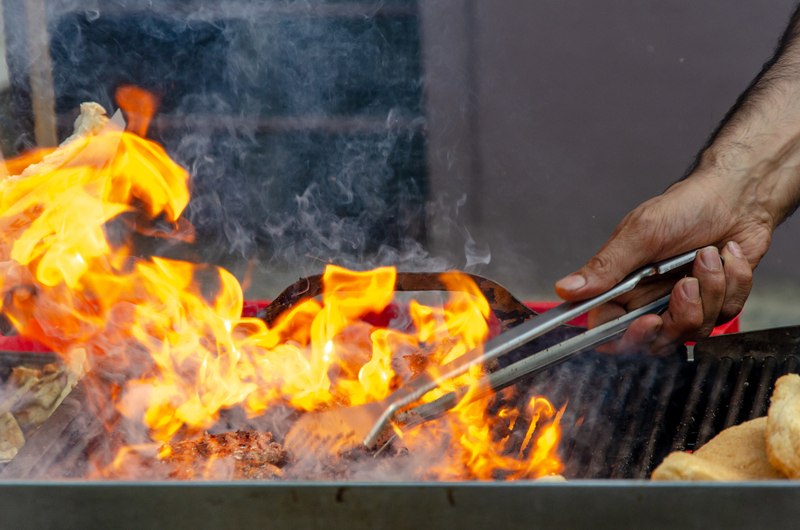
03 Aug Practicing Fire Safety When Grilling Out
Summer is in full swing, which means hotter temperatures, longer nights, and more social gatherings. And as you know, a big part of summer gatherings includes grilling out, be it with a gas or charcoal grill or even over an open fire. But with fire, comes the risk of injury and loss of personal property. A well-contained fire that you think is under control can quickly become out of control, harming you or your property. Luckily, there are some fire safety tips that can help you have a safer summer while grilling.
But first, did you know that according to the National Fire Protection Association’s (nfpa.org) Home Grill Fires report |NFPA, in 2014-2018 grills, hibachis, or barbecues were involved in an average of 10,600 home fires per year? These fires resulted in $149 million in direct property damage. Other interesting takeaways from the report include:
- July is the peak month for grill fires (18%), including structure, outdoor, or unclassified fires, followed by June (15%), May (13%), and August (12%).
- An unclean grill was a factor in 29% of the home grill structure fires.
- The leading area of origin for structure fires involving grills was an exterior balcony or open porch, and 44% of the property damage from grill structure fires resulted from fires that started there.
- Five of every six grills involved in home fires were fueled by gas (84%), while 12% used charcoal or another solid fuel.
- Gas grills were involved in an average of 8,900 home fires per year, and leaks or breaks were the primary problems with gas grills.
- Charcoal or other solid-fueled grills were involved in 1,300 home fires per year.
So, how do you avoid being part of these statistics? Remember to use propane, charcoal, and wood pellet barbecue grills outdoors only. And, when grilling, stay in constant sight of the grill because grill fires can get out of control quickly. If you’re looking to build a fire in a fire pit or campfire, remember to keep adequate space between the fire and any building or structure you’re near. For ultimate safety, build campfires at least 25 feet away from tents, trees, and anything that can catch fire. Use outdoor fireplaces and fire pits outdoors only and at least 10 feet away from your home (or deck).
Fire safety is one thing, but when you add in the other factors associated with grilling, like grease and gas, extra precautions are needed. Here are the specific top safety tips to consider when grilling (adapted from the National Home Security Alliance):
- When in use, keep your grill away from your house, porch, garage, awning, deck railing, and out from under eaves or landscaping. Never grill inside or in an enclosed area such as a garage, as both charcoal and gas grills produce potentially deadly carbon monoxide gas.
- Don’t wear loose clothing while grilling since it can catch fire. Also, wear oven mitts that extend far up on the forearm as well as a heavy apron to provide some protection from burns. And use long-handled grilling tools to keep your hands a safe distance from the lit grill.
- Keep children and pets at least three feet away from the grill while it is in use.
- Only use lighter fluid that is made for grilling. Do not use any other flammable liquids such as gasoline. If using a charcoal chimney to ignite your charcoal, avoid burns by using a long match.
- Once the fire has started, do not add more lighter fluid. And once the grill is lit, do not try to move it.
- Make sure you have a fire extinguisher within easy reach, and that you know how to use it.
- Never leave your grill unattended.
- Be sure to keep your gas grill components (i.e. gas line from tank to grill) in good shape; these should be inspected annually for leaks.
Fire safety while grilling also extends beyond the cooking process. Keeping your grill well-cleaned and inspected can help, too. Reduce the risks of grease fires and other potential problems by taking care of your grill between uses. How? First clean your grill; be sure to remove fat build-up and grease in the trays under the grill, as well as on the grill itself. Then, when you’re done using the grill, be sure it cools down completely before storing or covering the grill.
The summer season is great, but safety must be a priority. Protecting you, your loved ones, and your personal property is important when using outdoor grills and fire pits. What you don’t want is your next summer BBQ to end up with a massive insurance claim. Oh, and before you set up your outdoor cooking space or put in that fire pit, make sure to check your local ordinances to make sure you are in compliance.
If you were the victim of a structure fire from a grill or fire pit accident, contact us today. At Ohio Fire Claims, we will work with you and the insurance company to get a fair settlement. We will start your home’s remediation process right away to help you make a speedy financial recovery.
Contact us today for a free consultation or site inspection.

